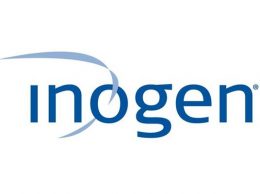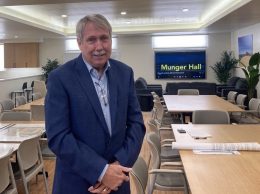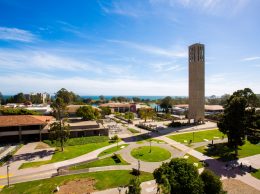$86.2M Inogen IPO puts Goleta startups in play
IN THIS ARTICLE
- Banking & Finance Topic
- Stephen Nellis Author
By Stephen Nellis Friday, December 6th, 2013
Goleta-based Inogen, a maker of portable oxygen concentrators founded by UC Santa Barbara students, has filed for an initial public offering to raise up to $86.2 million.
The company filed papers Nov. 27 to offer shares that would be listed on the Nasdaq under the symbol “INGN.” The company has 348 employees between its facilities in Goleta, Texas, Tennessee and Mississippi.
Inogen notched 354 percent revenue growth between 2009 and 2012, bringing 2012 sales to $48.6 million and eking out a modest profit. For the first nine months of this year, revenue expanded to $55.7 million, and profits stand at $3.9 million.
Inogen was founded in 2001 by three UCSB students, one of whom had a grandmother who had recently been placed on oxygen therapy. The therapy required heavy, bulky oxygen tanks that could not be taken on airplanes and other places.
After winning a business plan contest at UCSB, the team went on to develop a device that used electricity to concentrate oxygen from the air. The concentrators were lighter and less bulky than traditional systems, weighing between 4.8 and 7 pounds.
Inogen underwent a major overhaul in 2009, switching to selling and renting its devices directly to consumers. In its filings, the company said it is the only portable oxygen concentrator in the U.S. that sells directly to its customers.
In 2012, the company received $20 million in private equity financing from Novo A/S. Inogen’s other investors include Versant Ventures, Accuitive Medical Ventures, Avalon Ventures and Arboretum Ventures. J.P. Morgan is acting as lead book-runner for the offering, Leerink Swann is acting as lead manager, and William Blair and Stifel are acting as co-managers.
Inogen co-founder and current Chief Financial Officer Ali Bauerlein, who the Business Times named a Champion of Health Care earlier this year, was a 19-year-old college sophomore when she and her grandmother and fellow UCSB students Brenton Taylor and Byron Myers came up with the idea for a portable oxygen system. As a student in the Technology Management Program at UCSB’s College of Engineering, Bauerlein already had innovation on her mind when she was visiting her grandmother, who lived in Camarillo, in late 2000.
Her grandmother, Mae, had been put on oxygen therapy months earlier, and she shared with her family the difficulty of constantly switching tanks and carrying around an extra supply of bottles. “I really got to see firsthand her struggles with the existing technology,” Bauerlein told the Business Times earlier this year. “She would say, ‘Everything else has gotten smaller, lighter, better; why hasn’t my oxygen?’”
Bauerlein took her grandmother’s observations back to the engineering department, and soon she and teammates Taylor and Myers were writing a business plan and raising capital for a business that would build portable oxygen systems. Taylor and Myers also remain vice presidents at Inogen.
“I never thought, at 19, that I was going to start a medical device manufacturing company. We took it day by day and step by step,” Bauerlein told the Business Times earlier this year. “We just kept making progress, so we continued to pursue the company.”
A successful Inogen IPO would be a significant bump for UCSB’s Technology Management Program and New Venture Competition, which aim to teach students real-world entrepreneurial skills with the help of successful mentors from the business community. While many successful companies have been spun out of UCSB by professors and doctoral students, Inogen would likely be the first company founded by an undergraduate team to go public. Inogen won the program’s very first business plan competition in 2001.
“I think it’s a clear testimony to the quality of mentoring the students are getting from the business community and the folks at UCSB,” said Bob York, head of the Technology Management Program. “This is a great thing for Goleta, too, to have a home-grown company show that they can thrive here. We’d like to see a lot more of these.”
In an interview earlier this year, Bauerlein said her favorite part about creating Inogen was helping her grandmother. “Having an impact on my grandmother was very rewarding to me. Actually being able to give her a product that she used for a few years before she passed away was incredible,” she said. “She got to go on cruises and travel and do things she didn’t think she could do.”












